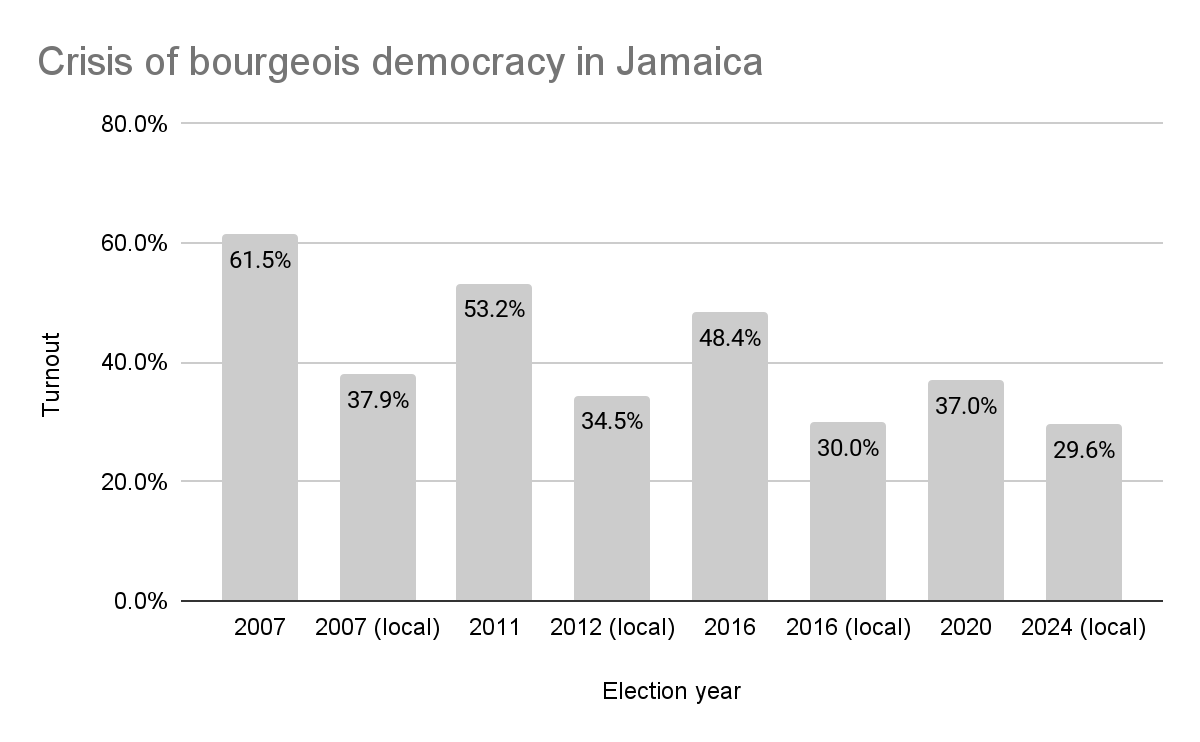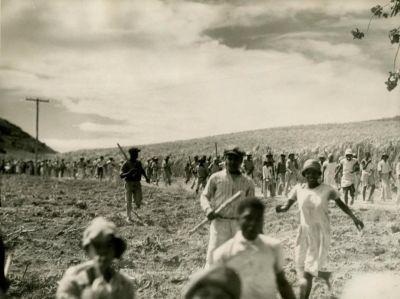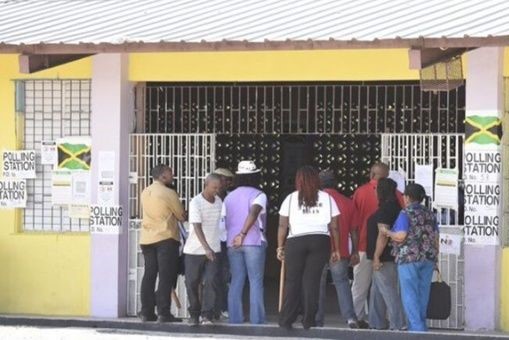The PNP and JLP went head-to-head in local elections on 26 February for the first time in eight years. But rather than an eagerness from voters to cast their votes, turnout was Jamaica’s lowest ever at barely 29 percent. This is a clear rejection of not just the PNP and JLP, but the whole rotten edifice of Jamaican capitalist ‘democracy’.
The preliminary results made it unclear as to who had ‘won’ nationally (with the PNP claiming the popular vote, and the JLP more municipalities), and so both parties declared victory and held celebrations. Days of delays for the few votes to be counted formally have led to concerns of vote rigging and fraud.
Dubbed prior as a ‘political doomsday’, trust in bourgeois democracy in Jamaica is at rock bottom. Constant corruption scandals and rising crime rates have led to a widespread distrust of politicians. At the 2020 general election, this was reflected in a low turnout of just 37 percent, down from 48.37 percent in 2016. Both elections beat the record lows set by the previous elections
In a poll last year, 28.1 percent were more inclined to vote for the PNP compared to 27.9 percent for the JLP. And those not voting or undecided were 25 percent and 19 percent, respectively. Without any alternative, apathy with the political establishment is seemingly widespread despite an overwhelming desire for systemic change.
When the PNP candidate unseated a JLP councillor in Old Harbour South Division, the JLP Minister of Works Everald Warmington, declared to a JLP-supporting crowd that no PNP councillor would spend ‘his’ money, and the JLP candidate might “not be the councillor in name, but him in charge”! This brazen corruption and sense of entitlement caused a huge backlash on social media.
The last two decades of austerity and state corruption have sharply revealed class contradictions. Years of broken promises and betrayals have eroded confidence in all the political parties and state institutions. Only revolutionary class struggle can break this impasse.
Imperialist exploitation and austerity
 Years of broken promises and betrayals have eroded confidence in all the political parties and state institutions / Image: own work
Years of broken promises and betrayals have eroded confidence in all the political parties and state institutions / Image: own work
The JLP has courted billions of dollars(J$) worth of Chinese capital for projects such as the Kingston Freeport Terminal, major highways, and medical services. Jamaica is a market in which China is gaining a strategic foothold, which the government is more than happy to oblige.
In addition, a single Russian company RUSAL now controls 65 percent of alumina capacity and 3 out of 4 refineries demonstrating how accommodating of foreign capital the JLP are. The Jamaican bourgeoisie are playing imperialist interests against one another to their advantage.
The US is still Jamaica’s largest trading partner, dominating bauxite mining and tourism, with the former making up two-thirds of all exports, generating huge profits. But now US dominance is weakening, much to the alarm of the imperialists.
The profound shifts taking place in world relations, and the relative decline of US imperialism has seen Jamaica emboldened to consider applying for BRICS membership.
Jamaica is nevertheless still dominated by US imperialism through institutions like the IMF. The IMF is singing the praises of the Jamaican economy for halving its debt-to-GDP ratio from 144 percent to 72 percent over a decade. From reading the IMF reports and ‘JamaicaWatch’ articles in the Financial Times, one would think that the economy is booming. In reality, it isn’t growing at all and only achieves public debt reduction through brutal cuts and austerity.
IMF loans and debt repayments provide the JLP with the perfect excuse for why they’re making cuts. Absolving themselves, they say it’s out of their hands. Finance Minister Nigel Clarke claims the reason for the JLP’s austerity measures is to achieve “economic stability first then growth”.
All this talk is an absolute fantasy. The reality is that we are living in a period of great instability, with revolutionary perspectives opening up across every continent, and the need for a revolutionary party growing more urgent by the day.
The JLP and PNP cannot hide behind each other or blame the IMF for austerity forever. Now more than ever, every national market is bound up with the fate of the world economy, and especially dominated and export-dependent economies like Jamaica, which is vulnerable to shocks.
In recent years, COVID, combined with especially severe tropical storms resulted in a contraction of 10.2 percent of GDP of the economy. And although unemployment is a low 4.5 per cent, youth unemployment is high at 16.7 percent alongside miserably low wages and rising prices.
Austerity fueling discontent
A recent article in the Jamaica Gleaner shed light on the reality of austerity felt across the island. Since the closure of a sugar factory in 2017, Clark’s Town has fallen into neglect.
The community suffers from a poor water supply, deteriorating roads, and irregular refuse collections, while the youth are leaving in search of work in the tourism sector. Local shops and businesses have closed as a result. Such is the poor housing situation, people are beginning to live on the old factory grounds. Travelling by road is often called ‘dandy shandy’ – a children’s dodge game – such is their poor condition.
The youth and most vulnerable people are highly cynical about the ability of politicians to protect jobs and wages or improve water, roads, housing, healthcare, or education. They correctly identify that politicians represent the interests of big business and fawn over the lucrative contracts they can garner from big business; American, Chinese, Russian, or Jamaican, it makes no difference to them.
The JLP represent the interests of the conservative establishment and serves the interests of imperialist allies. The PNP long ago abandoned any semblance of a left-wing program and shifted to the right, today paying mere lip service to reform.
The widespread desire to kick out the crooked capitalist politicians has no means for political expression yet but a growing number of workers are fighting back in the workplace.
Industrial action
The last few years have seen a rise in activity on the industrial front. Teachers, Water Commission workers, bus drivers, and nurses have fought back against cuts. In 2022, strike action by Water Commission workers supposedly cost the Commission J$240 million in revenue.
In desperation to hold back the rising tide, PM Andrew Holness sought to de-classify them as essential workers in a failed attempt to prevent them from striking. Then in mid-March last year, Clarke forced public sector workers to accept derisory pay rises otherwise they would get no retrospective pay for two years. The following month, the body negotiating public sector pay awarded themselves a pay rise of 200 percent!
This outrage should have been cause for widespread strikes. However, the leadership of the Jamaica Confederation of Trade Unions (JCTU) has repelled calls from its member unions to renegotiate pay deals with the government, let alone strike action. Since then, a steady stream of public sector workers have quit, seeking better pay overseas.
Notably, the overwhelming majority of those who work in the vast, multi-billion dollar hotel and tourism sectors are non-unionised and work precarious contracts. If hospitality workers began to organise, coordinate, and wage a militant sector-wide strike for better pay and conditions then they would likely win concessions and act as a rallying call to workers in other sectors.
The example set by air traffic controllers, who walked off the job in 2022, revealed that militant action gets results. What’s lacking is revolutionary leadership capable of raising the sights of workers and youth against the bosses, the imperialists, and their representatives in Parliament – linking the economic struggle with the political struggle.
Revolutionary traditions
 It was only as a result of the fearless class battles waged by workers against the bosses and imperialists that concessions were won / Image: libcom
It was only as a result of the fearless class battles waged by workers against the bosses and imperialists that concessions were won / Image: libcom
On the question of industrial action, it’s worth highlighting the historic general strike of 1938 and the revolutionary turmoil of the 1970s, which are rich in important lessons. It was only as a result of the fearless class battles waged by workers against the bosses and imperialists that concessions were won.
The ruling class has never granted any concession to the working class out of the kindness of their hearts. It requires the methods of class struggle to squeeze them out of the ruling class and to defend them. However, the struggle for economic reforms is constant as the capitalists relentlessly try to roll them back.
The only real way to defend and guarantee genuine reforms is by abolishing the capitalist system. There is no time for waiting for the ruling class to ‘achieve stability then growth’ for reforms to come. It’s time for workers and youth to go on the offensive.
Broken republican promises
When universal suffrage was won in 1944, the PNP and JLP promised to make Jamaica a republic. They still make this empty promise 80 years later! Barbados became a republic last year, which reignited the issue and put pressure on the JLP to hold a referendum.
The Jamaican establishment has no intention of cutting ties with the British ruling class because their interests are the same. Holness presents himself as a republican but his reluctance to call a referendum speaks volumes.
In fact, Holness says that Jamaica should only become a republic as long as the United Kingdom Privy Council remains Jamaica’s appeals court. The PNP has stated they’ll oppose Jamaica becoming a republic if this is the proposal. This impasse conveniently allows both parties to accuse the other of impeding constitutional reform.
As communists, we have no illusions that republicanism on a capitalist basis will fundamentally alter the lives of the working class. For that to happen, the fight for a republic must be bound up with the fight for a socialist revolution – abolishing the rule of a feudal monarchy, kicking out the imperialists, and overthrowing the national bourgeoisie.
The JLP is as incompetent as it is corrupt, with Holness narrowly escaping prosecution for corruption this year relating to conflicts of interest in companies that received government funds. And, reminiscent of the COVID lockdown parties held by Tory UK government officials, a cabinet minister was forced to resign after a video of him emerged having a lockdown party toasting with Moet champagne and shouting ‘No-Movement Day’.
The growing class divide is clear for all to see and the crisis of Jamaican capitalism is laying the ground for huge social explosions.
For a revolutionary workers’ party!
There is a palpable sense of class hatred and anger in every city, town, and village. As long as basic infrastructure remains neglected and wages stagnate as the cost of living soars, the pressure in society will only continue to build.
But what happens when momentous social explosions do occur? To paraphrase Trotsky, without a revolutionary organisation, the energy of the masses in a revolutionary situation would dissipate like steam without a piston box.
There have been many revolutionary situations where the working class held power in their hands, but was let down by its reformist leaders. This cannot be allowed to happen again. Therefore, there is an urgent need to build a revolutionary party based on a Marxist program and methods.
If you agree then join and help us build as part of the Revolutionary Communist International in Jamaica.
We say:
- Neither JLP nor PNP: for a revolutionary workers’ party!
- End low-paid precarious work! Conduct nationally coordinated strike action against the bosses!
- Nationalise the commanding heights of the economy without compensation to the imperialists! For democratic workers’ control as part of a rationally planned economy!
- For a workers’ republican state of Jamaica, and a Socialist Federation of the Caribbean and Latin America!
